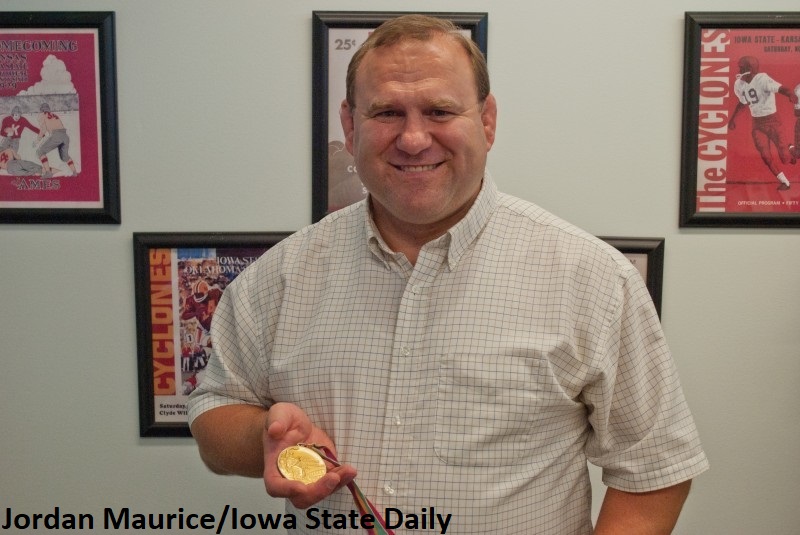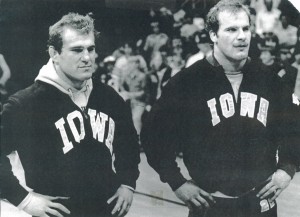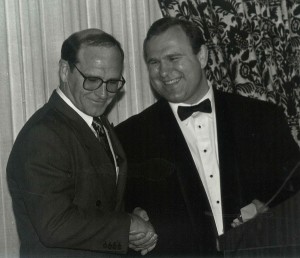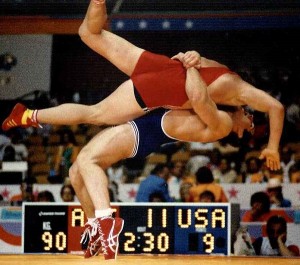
Ferocity, Intensity Helped Ed Banach Win On Mat
By Noah Rohlfing
Iowa State Daily
The Mister Ed theme song echoed throughout Carver-Hawkeye Arena.
“A horse is a horse, of course of course, and no one can talk to a horse, of course!”
Ed Banach stepped onto the mat and the crowd went wild. Ever the entertainer, Banach was on the road to being one of the most decorated freestyle wrestlers of the 1980s.
His career led him to Olympic glory on U.S. soil, a hand in four national championships as a player and a coach, and a place in the National Wrestling Hall of Fame.
 The road to gold began when Banach took up wrestling in Port Jervis, New York, as a young man. There, while wrestling with his brother Steve and his fraternal twin Lou, Banach’s goals became crystal clear: He wanted to make the Olympics, and he was going to do whatever he possibly could to make that dream come true.
The road to gold began when Banach took up wrestling in Port Jervis, New York, as a young man. There, while wrestling with his brother Steve and his fraternal twin Lou, Banach’s goals became crystal clear: He wanted to make the Olympics, and he was going to do whatever he possibly could to make that dream come true.
So in 1980, Ed and Lou made the trip to Iowa City that would change their lives.
Iowa head wrestling coach and legendary Iowa State wrestler Dan Gable, who himself won a gold medal in the 1972 Olympics, was in his fourth season with the Hawkeyes and coming off of two straight team national championships when the Banach twins arrived. Even with the success his team was having, Gable said that there wasn’t a wealth of fan enthusiasm around the program at the time.
But when Ed started to wrestle and win matches, the crowds began to grow, and the atmosphere surrounding the program changed.
“The crowds went crazy for Ed,” Gable said. “He had a little bit of an edge.”
Gable and Banach began to use walkout songs to pump up the crowd, and Ed’s song, which laid out his nickname (“The Horse”), was the one that stuck in the minds of fans and wrestlers alike.
(Gable even sang a verse of the song when he was interviewed for this story.)
It was one of many examples Gable gave when he spoke of the indelible impact Banach left on the program. In fact, it was difficult for Gable to come up with any one player who had a more successful career.
 “When you think about it, nobody is higher on the credential list than Ed,” Gable said.
“When you think about it, nobody is higher on the credential list than Ed,” Gable said.
Banach would win three individual national championships while at the University of Iowa, with his only loss coming in 1982 at the hands of then-Oklahoma wrestler Mark Schultz (yes, the Mark Schultz from Foxcatcher).
Gable said that the match Banach lost was down to him getting away from the set game plan, and that his early success “throwing gas on the fire” turned against him later in the match.
After the loss, though, Banach practiced harder than he ever had before. Hundreds of early morning training sessions later, Banach faced off against another Big Eight wrestler in the 1983 championships. This time, it was Mike Mann of Iowa State.
This time, Banach stuck to his guns. He walked out with his third national championship in four years, and the Iowa record for pins with 73.
The victory earned him a spot on the United States World Championship team for 1983, and he spent two weeks in Moscow behind the Steel Curtain. Competing against the best the USSR had to offer, he was struck by their ability.
“I had fun in Moscow, but it was the toughest tournament of my life,” Banach said.
Banach finished in seventh at the Worlds but received valuable international experience.
Then came Olympic Trials in 1984. A familiar face was the coach of the U.S. team, but Banach had to earn his way to Los Angeles through open qualifying.
Banach had gone through open qualifying in 1980 as well, but failed to advance from his pool. He didn’t end up missing anything, as President Jimmy Carter held the U.S. out of the 1980 Moscow Games in protest of the Soviet Union.
As Banach progressed through his pool to the tournament finals in Grand Rapids, Michigan, in June of 1984, a lot was at stake. The Soviet Union had announced a boycott of the Los Angeles games, and the wrestling competition was blown wide open.
Without the group widely recognized as one of the toughest in the world, the competing U.S. wrestlers knew that making it to Los Angeles now meant the chances of gold on American soil had just gotten a Moscow-sized boost.
Both Ed and his brother Lou made the final roster and flew out to Big Bear Lake, California, to train at high altitude (Ed was regarded as an incredibly conditioned wrestler) before Los Angeles beckoned.
It was early in August when the freestyle wrestling competition began, and Banach wasted no time dominating his competition. He won his four group matches by a combined score of 37-4, and that’s not even taking into account the last group match, in which he won via fall within 45 seconds.
 Then came the group finals. Confident as ever, he dispatched of Clark Davis (Canada) and Ismail Temiz (Turkey) in 11-0 and 11-2 decisions, respectively. He was on a roll, but one challenge still stood in the way of a gold medal.
Then came the group finals. Confident as ever, he dispatched of Clark Davis (Canada) and Ismail Temiz (Turkey) in 11-0 and 11-2 decisions, respectively. He was on a roll, but one challenge still stood in the way of a gold medal.
That man was Akira Ota of Japan.
On Aug. 9, 1984, Ed Banach stepped onto the mat in the Anaheim Convention Center, one match from destiny. One opponent away from the goal he’d been dreaming of for his entire adult life. Under the guise of his college coach and mentor, he was so damn close to the gold.
He suffered a concussion early on in the match, but kept going. Looking at video of the match, it’s difficult to tell exactly when the blow occurred, but Banach seemed unaffected. He used his trademark tenacity, his energy, and his technique to pummel Ota. The match went Banach’s way 15-3.
In his post-match interview, Banach’s voice was filled to the brim with relief and satisfaction.
Thirty-four years later, Banach still exhibits that same tone when talking of that triumphant moment.
“I was just so relieved,” Banach said. “It had finally happened.
“It was wonderful.”
“The Horse” had galloped to victory on home soil, in front of friends and family and a nation. He had completed his biggest goal, spurred on by his brother Lou and the motivation of Gable.
But the concussion Banach suffered that night, along with the many he suffered throughout his career, plagued him during his final years of wrestling. He began to get migraine headaches when he hit his head, and his professional dreams were stifled.
So he chose to begin a new chapter of his wrestling life.
In 1985, Jim Gibbons, a former NCAA individual national champion at Iowa State, took over from the retiring Dr. Harold Nichols. A couple of months after being hired, he looked to Iowa City for one of his assistants.
He thought Ed Banach was just the guy the Cyclones needed.
“I have a lot of admiration for Ed’s intensity,” Gibbons said. “I was looking for a dose of [Ed’s] optimism.”
The move was beneficial for both parties, and Iowa State grew rapidly as a program over the next two seasons. In 1987, Gibbons, Banach, and the Cyclones stopped Banach’s mentor Dan Gable and his pursuit of a record 10th-straight team national championship. The Cyclones became national champions in Gibbons’ third year and kept the title in the state of Iowa.
Banach, according to Gibbons and Gable, was on the fast track to one day becoming a head coach. With his pedigree as a gold medalist and his training from national champion coaches, he certainly had the resumé.
Once again, though, his history of concussions would rear its ugly head. During a practice in 1987, he took a blow to the head while teaching a technique.
The migraine he received plagued him until he consulted a neurologist and chose to retire from coaching in 1989. He became one of the first well-known athletes in the U.S. to publicly suffer from post-concussion syndrome, and his bright future in coaching was cut short.
At the age of 29, Ed Banach was out of wrestling.
Moving off the mat, Banach took up a role in student-athlete academic counseling at Iowa State and went around doing speaking engagements.
One thing he always did when going out to speak was bring his gold medal from 1984 for everyone to see. It brought hundreds of people joy every time he pulled it out. For Banach, that’s what the gold medal is supposed to do. The sense of pride that the medal brings never goes away, he said.
“It’s meant to be shared,” Banach said. “I love giving back.”
Banach hasn’t lost his loyalty to the state of Iowa and to the Cyclones. Until retiring on Feb. 1, he was working in the university’s compliance department as an assistant director, primarily with eligibility matters. Banach is not at Iowa State anymore, but he made his mark.
Thirty-one years after winning a national title together, as Gibbons talks about Banach and his accomplishments, he mentions one thing over and over.
“They don’t realize how absolutely ferocious he was as a competitor,” Gibbons said.
That ferocity is what earned him the nickname “The Horse,” three national titles, an Olympic gold, and a place in the National Wrestling Hall of Fame.
Banach’s plaque in Stillwater, Oklahoma, says it best.
"[Ed was] a thoroughbred in all respects.”
Iowa State Daily
The Mister Ed theme song echoed throughout Carver-Hawkeye Arena.
“A horse is a horse, of course of course, and no one can talk to a horse, of course!”
Ed Banach stepped onto the mat and the crowd went wild. Ever the entertainer, Banach was on the road to being one of the most decorated freestyle wrestlers of the 1980s.
His career led him to Olympic glory on U.S. soil, a hand in four national championships as a player and a coach, and a place in the National Wrestling Hall of Fame.
 The road to gold began when Banach took up wrestling in Port Jervis, New York, as a young man. There, while wrestling with his brother Steve and his fraternal twin Lou, Banach’s goals became crystal clear: He wanted to make the Olympics, and he was going to do whatever he possibly could to make that dream come true.
The road to gold began when Banach took up wrestling in Port Jervis, New York, as a young man. There, while wrestling with his brother Steve and his fraternal twin Lou, Banach’s goals became crystal clear: He wanted to make the Olympics, and he was going to do whatever he possibly could to make that dream come true.So in 1980, Ed and Lou made the trip to Iowa City that would change their lives.
Iowa head wrestling coach and legendary Iowa State wrestler Dan Gable, who himself won a gold medal in the 1972 Olympics, was in his fourth season with the Hawkeyes and coming off of two straight team national championships when the Banach twins arrived. Even with the success his team was having, Gable said that there wasn’t a wealth of fan enthusiasm around the program at the time.
But when Ed started to wrestle and win matches, the crowds began to grow, and the atmosphere surrounding the program changed.
“The crowds went crazy for Ed,” Gable said. “He had a little bit of an edge.”
Gable and Banach began to use walkout songs to pump up the crowd, and Ed’s song, which laid out his nickname (“The Horse”), was the one that stuck in the minds of fans and wrestlers alike.
(Gable even sang a verse of the song when he was interviewed for this story.)
It was one of many examples Gable gave when he spoke of the indelible impact Banach left on the program. In fact, it was difficult for Gable to come up with any one player who had a more successful career.
 “When you think about it, nobody is higher on the credential list than Ed,” Gable said.
“When you think about it, nobody is higher on the credential list than Ed,” Gable said.Banach would win three individual national championships while at the University of Iowa, with his only loss coming in 1982 at the hands of then-Oklahoma wrestler Mark Schultz (yes, the Mark Schultz from Foxcatcher).
Gable said that the match Banach lost was down to him getting away from the set game plan, and that his early success “throwing gas on the fire” turned against him later in the match.
After the loss, though, Banach practiced harder than he ever had before. Hundreds of early morning training sessions later, Banach faced off against another Big Eight wrestler in the 1983 championships. This time, it was Mike Mann of Iowa State.
This time, Banach stuck to his guns. He walked out with his third national championship in four years, and the Iowa record for pins with 73.
The victory earned him a spot on the United States World Championship team for 1983, and he spent two weeks in Moscow behind the Steel Curtain. Competing against the best the USSR had to offer, he was struck by their ability.
“I had fun in Moscow, but it was the toughest tournament of my life,” Banach said.
Banach finished in seventh at the Worlds but received valuable international experience.
Then came Olympic Trials in 1984. A familiar face was the coach of the U.S. team, but Banach had to earn his way to Los Angeles through open qualifying.
Banach had gone through open qualifying in 1980 as well, but failed to advance from his pool. He didn’t end up missing anything, as President Jimmy Carter held the U.S. out of the 1980 Moscow Games in protest of the Soviet Union.
As Banach progressed through his pool to the tournament finals in Grand Rapids, Michigan, in June of 1984, a lot was at stake. The Soviet Union had announced a boycott of the Los Angeles games, and the wrestling competition was blown wide open.
Without the group widely recognized as one of the toughest in the world, the competing U.S. wrestlers knew that making it to Los Angeles now meant the chances of gold on American soil had just gotten a Moscow-sized boost.
Both Ed and his brother Lou made the final roster and flew out to Big Bear Lake, California, to train at high altitude (Ed was regarded as an incredibly conditioned wrestler) before Los Angeles beckoned.
It was early in August when the freestyle wrestling competition began, and Banach wasted no time dominating his competition. He won his four group matches by a combined score of 37-4, and that’s not even taking into account the last group match, in which he won via fall within 45 seconds.
 Then came the group finals. Confident as ever, he dispatched of Clark Davis (Canada) and Ismail Temiz (Turkey) in 11-0 and 11-2 decisions, respectively. He was on a roll, but one challenge still stood in the way of a gold medal.
Then came the group finals. Confident as ever, he dispatched of Clark Davis (Canada) and Ismail Temiz (Turkey) in 11-0 and 11-2 decisions, respectively. He was on a roll, but one challenge still stood in the way of a gold medal.That man was Akira Ota of Japan.
On Aug. 9, 1984, Ed Banach stepped onto the mat in the Anaheim Convention Center, one match from destiny. One opponent away from the goal he’d been dreaming of for his entire adult life. Under the guise of his college coach and mentor, he was so damn close to the gold.
He suffered a concussion early on in the match, but kept going. Looking at video of the match, it’s difficult to tell exactly when the blow occurred, but Banach seemed unaffected. He used his trademark tenacity, his energy, and his technique to pummel Ota. The match went Banach’s way 15-3.
In his post-match interview, Banach’s voice was filled to the brim with relief and satisfaction.
Thirty-four years later, Banach still exhibits that same tone when talking of that triumphant moment.
“I was just so relieved,” Banach said. “It had finally happened.
“It was wonderful.”
“The Horse” had galloped to victory on home soil, in front of friends and family and a nation. He had completed his biggest goal, spurred on by his brother Lou and the motivation of Gable.
But the concussion Banach suffered that night, along with the many he suffered throughout his career, plagued him during his final years of wrestling. He began to get migraine headaches when he hit his head, and his professional dreams were stifled.
So he chose to begin a new chapter of his wrestling life.
In 1985, Jim Gibbons, a former NCAA individual national champion at Iowa State, took over from the retiring Dr. Harold Nichols. A couple of months after being hired, he looked to Iowa City for one of his assistants.
He thought Ed Banach was just the guy the Cyclones needed.
“I have a lot of admiration for Ed’s intensity,” Gibbons said. “I was looking for a dose of [Ed’s] optimism.”
The move was beneficial for both parties, and Iowa State grew rapidly as a program over the next two seasons. In 1987, Gibbons, Banach, and the Cyclones stopped Banach’s mentor Dan Gable and his pursuit of a record 10th-straight team national championship. The Cyclones became national champions in Gibbons’ third year and kept the title in the state of Iowa.
Banach, according to Gibbons and Gable, was on the fast track to one day becoming a head coach. With his pedigree as a gold medalist and his training from national champion coaches, he certainly had the resumé.
Once again, though, his history of concussions would rear its ugly head. During a practice in 1987, he took a blow to the head while teaching a technique.
The migraine he received plagued him until he consulted a neurologist and chose to retire from coaching in 1989. He became one of the first well-known athletes in the U.S. to publicly suffer from post-concussion syndrome, and his bright future in coaching was cut short.
At the age of 29, Ed Banach was out of wrestling.
Moving off the mat, Banach took up a role in student-athlete academic counseling at Iowa State and went around doing speaking engagements.
One thing he always did when going out to speak was bring his gold medal from 1984 for everyone to see. It brought hundreds of people joy every time he pulled it out. For Banach, that’s what the gold medal is supposed to do. The sense of pride that the medal brings never goes away, he said.
“It’s meant to be shared,” Banach said. “I love giving back.”
Banach hasn’t lost his loyalty to the state of Iowa and to the Cyclones. Until retiring on Feb. 1, he was working in the university’s compliance department as an assistant director, primarily with eligibility matters. Banach is not at Iowa State anymore, but he made his mark.
Thirty-one years after winning a national title together, as Gibbons talks about Banach and his accomplishments, he mentions one thing over and over.
“They don’t realize how absolutely ferocious he was as a competitor,” Gibbons said.
That ferocity is what earned him the nickname “The Horse,” three national titles, an Olympic gold, and a place in the National Wrestling Hall of Fame.
Banach’s plaque in Stillwater, Oklahoma, says it best.
"[Ed was] a thoroughbred in all respects.”